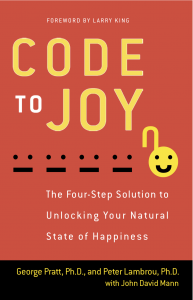I used to have this problem. It’s going to sound crazy, but it’s true.
I had road direction anxiety. Not road rage — more like road haze.
Here’s how this worked: whenever I had to drive somewhere I hadn’t been to before, I would get so anxious I would completely freeze up. (This was in the pre-GPS days.) Road map? Great directions? Didn’t matter. I would become a basket case.
Ask my wife. She’s seen it. I consider myself generally a fairly intelligent, capable guy — but I could get lost going from the bedroom to the living room. And Bart Simpson pictures aside, that is not as much of an exaggeration as you may think. I was at a restaurant a few years ago meeting with my agent and a potential coauthor, and I got up to use the men’s room. When I came back out, I was lost. I’m serious.
I’ve had this condition my whole life. And guess what?
It’s gone.
Gone.
In fact, you can read about exactly how it got gone, and how dozens of other people lost all manner of fear, paralyzing terror, sadness, depression, jealousy, heartbreak, ennui, existential angst, insecurities, nervousness, addiction, self-sabotage, and other self-defeating issues—and learn exactly, precisely how to do the same thing yourself—in my new book, Code to Joy, launching exactly two weeks from today.
Drs. George Pratt and Peter Lambrou have spent decades studying what they call the “fog of distress” that afflicts virtually all of us to one degree or another.
Typically, this vague sense of unease parks itself in the background, like the annoying hum of a refrigerator or air conditioner we have learned to block out from our conscious awareness. But whether we are aware of it or not, it pervades our existence like an insistent headache, interfering with our ability to have healthy relationships, to perform to our potential at work, or to have lives that are anywhere near as fulfilling as they could be.
Over the years, that background hum can sabotage our careers, friendships, marriages. Sometimes even our physical health starts to suffer.
For some, this fog of distress shows up in very distinct and specific ways, such as an unshakable fear or irrational anxiety, a problem in one particular area of life. For others, it is more vague and generalized.
That is, it’s not that any one specific thing is so terribly wrong. It’s more that nothing is quite right. [from the Introduction]
According to George and Peter, you can’t address this fog of distress purely through the reason or logic of dialog, even with the most expert counseling, because it lodges not only in our subconscious, but also in our biofield at a cellular and energetic level.
This is why popular approaches of repeated affirmations and visualization, while they can work, to some extent and for some people, are still fairly limited.
 What George and Peter’s four-step method does is combine key techniques from cognitive science, imagery, and bioenergetics (similar to acupuncture), to work on all three levels at once: body, mind, and biofield.
What George and Peter’s four-step method does is combine key techniques from cognitive science, imagery, and bioenergetics (similar to acupuncture), to work on all three levels at once: body, mind, and biofield.
So … the day after George and Peter treated me, here’s what happened:
I had to go interview someone, in an out-of-the-way neighborhood of a city I’d never been in before, out in the sticks, at the end of a long route of twists and turns. And I had no reliable directions. I knew I would be hopelessly lost within minutes. Just knew it.
But that’s not what happened.
Not only did I not get lost, I never had a single moment of anxiety. I rolled down the window, enjoyed the scenery, and casually just drove, way out in the middle of nowhere. I never panicked, not even for a moment—and I found my way there with no problem whatsoever.
Nothing like this had ever happened to me before.
And here’s the wildest part: when the good doctors had worked with me, the previous day? It was for some totally unrelated issue, having to do with cleaning up hurt feelings from an old relationship years past. They didn’t know about my road haze.
I hadn’t even told them about it.
After that, writing a book with them was more than a job: it was … well, a joy!
P.S.: You can find the story of my weird road-haze and how my intrepid coauthors eliminated it in the first two chapters of the book—but you’ll have to look carefully: like all the other stories in the book, the names are changed to protect the innocent, so I’m there in disguise!

